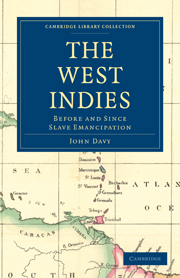 The West Indies, Before and Since Slave Emancipation
The West Indies, Before and Since Slave Emancipation Book contents
- Frontmatter
- Preface
- Contents
- ERRATA
- CHAPTER I INTRODUCTORY
- CHAPTER II BARBADOS
- CHAPTER III
- CHAPTER IV BARBADOS
- CHAPTER V ST. VINCENT
- CHAPTER VI THE GRENADINES
- CHAPTER VII GRENADA
- CHAPTER VIII TOBAGO
- CHAPTER IX ST. LUCIA
- CHAPTER X TRINIDAD
- CHAPTER XI BRITISH GUIANA
- CHAPTER XII ANTIGUA
- CHAPTER XIII MONTSERRAT
- CHAPTER XIV ST. CHRISTOPHER'S
- CHAPTER XV NEVIS
- CHAPTER XVI DOMINICA
- CHAPTER XVII WEST INDIAN TOWNS
- CHAPTER XVIII CONCLUDING
- Frontmatter
- Preface
- Contents
- ERRATA
- CHAPTER I INTRODUCTORY
- CHAPTER II BARBADOS
- CHAPTER III
- CHAPTER IV BARBADOS
- CHAPTER V ST. VINCENT
- CHAPTER VI THE GRENADINES
- CHAPTER VII GRENADA
- CHAPTER VIII TOBAGO
- CHAPTER IX ST. LUCIA
- CHAPTER X TRINIDAD
- CHAPTER XI BRITISH GUIANA
- CHAPTER XII ANTIGUA
- CHAPTER XIII MONTSERRAT
- CHAPTER XIV ST. CHRISTOPHER'S
- CHAPTER XV NEVIS
- CHAPTER XVI DOMINICA
- CHAPTER XVII WEST INDIAN TOWNS
- CHAPTER XVIII CONCLUDING
Summary
The native population of Barbados is less mixed than that of any other of our West Indian colonies. It consists of two principal classes, the white and the colored; the one chiefly of English descent, the other of African, including half castes. All born to the soil, all speaking the same language, and having the same habits and usages, they may be considered, as they truly are, a united people with common interests binding them together; and since slavery has been abolished, and prejudice relative to color overcome—as it is in a great degree—happily free from any great element of disruption or dissension likely to set class against class and endanger the peace of the community. An advantage this certainly not inconsiderable, especially compared with the state of the island before emancipation, when a servile war from slave insurrection was always more or less apprehended; it had more than once taken place; and when in consequence every white man was an enrolled soldier, and liable at a moment's warning to be called out on military duty.
According to the last census, that of 1851, the total population of the island was then 135,939, which gives the large proportion of 817 to the square mile—a proportion surpassing that of any European country, Malta excepted, and equal even to any Asiatic, not excepting China.
- Type
- Chapter
- Information
- The West Indies, Before and Since Slave EmancipationComprising the Windward and Leeward Islands’ Military Command, pp. 64 - 107Publisher: Cambridge University PressPrint publication year: 2010First published in: 1854


